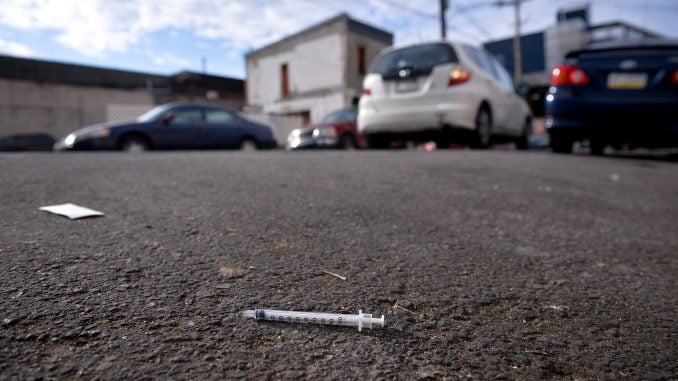
WILMINGTON, N.C. — Until the opioid epidemic began seeping into nearly every city and town in the country, the idea of a Main Street storefront offering free needles, alcohol wipes and small metal cookers for heroin users was unthinkable in a conservative Southern city like this one.
But these days, most of the roughly 100,000 residents of this historic port on the Cape Fear River are painfully aware that their community has a drug problem. Syringes carpet sections of public walkways, drug users congregate in vacant lots, and an increasing number of residents are attending the funerals of friends and family members who have died of an opioid overdose.
As a result, many police officers here fully support syringe exchanges, places where drug users can go to dispose of used needles, pick up fresh ones, get health exams, and maybe find out about treatment options. They say they’re willing to overlook the fact that possessing drug paraphernalia, including syringes, is an arrestable offense.
But even in N.C. where the state Sheriffs’ Association helped a grassroots harm reduction organization enact the most liberal syringe exchange law in the country in 2016, many cops still insist that giving free supplies to heroin users simply enables their drug use.
“Police officers are just like the rest of the public,” said Capt. Lars Paul of the Fayetteville Police Department. “Until I was educated on harm reduction, I questioned why we were giving drug users all kinds of free supplies, too. It was just a matter of taking the time to talk to folks and learn about the public health benefits of syringe exchanges.”
Kendra Williams, a recovering addict who works part-time for the Wilmington syringe exchange, said some cops in the drug unit there still don’t take the law seriously. “They’ll take away ID cards proving they’re syringe exchange clients and tell them it doesn’t mean anything. If they want to arrest you, they’ll find a way.”
Last year, a poll in Ohio — among the nation’s hardest-hit states — found that half of adults in that state favor syringe exchange programs. Politicians are listening.
Nationwide, at least a dozen states legalized syringe exchanges in 2016 and 2017, said Daniel Raymond, policy director of the Harm Reduction Coalition, a New York-based national organization that advocates for syringe exchanges. And nearly all of the new laws were signed by Republican governors and approved by GOP-led legislatures, including in Ohio.
Even so, most of the lawmakers and governors who ultimately approved the laws resisted until they received endorsements from law enforcement groups, Raymond said. Otherwise, they would have risked appearing soft on crime.
A dozen states — Florida, Indiana, Kentucky, Louisiana, Montana, New Hampshire, North Carolina, North Dakota, Ohio, Tennessee, Utah and Virginia — enacted laws in 2016 and 2017 that protect the employees and clients of syringe exchanges from existing state drug paraphernalia laws that otherwise could be used to prosecute them for possessing a syringe, according to Raymond.
Five more Republican-led states, Alabama, Arizona, Georgia, Iowa and Missouri, are considering similar legislation this year, he said.
Syringe exchanges, also known as needle exchanges, first came into being in the late 1980s in places such as New York City and San Francisco when it became clear that the HIV/AIDS epidemic was spreading through needle sharing among injection drug users.
But until recently, syringe exchanges were nonexistent in rural towns and cities in the rest of the country, except for informal underground efforts organized by advocates.
In North Carolina, syringe exchanges now are cropping up in office parks, pawn shops, church basements, fire stations, hotel parking lots and treatment centers throughout the state, and the state health department is tracking their progress. So far, 26 syringe exchanges have opened, and the coalition is working to open more.
“Until the law was enacted, people were afraid they’d be arrested if they came to pick up supplies,” said Robert Childs, director of the North Carolina Harm Reduction Coalition.
North Carolina’s law made it simple for a syringe exchange to open its doors, he said. For underground groups already supplying drug users with sterile supplies, it simply meant registering with the state health department and providing a plan to ensure the privacy of clients. For new groups, it meant finding funding and a base of operations, even if it was a private vehicle in a parking lot.
Unlike the AIDS epidemic of the 1980s and previous drug epidemics, which were spawned and largely defeated in urban areas, this opioid epidemic is ensnaring people who live in far-flung small cities and rural communities. In addition to mounting overdose deaths, these rural communities are experiencing unprecedented surges in hepatitis C infections and increasing threats of HIV/AIDS outbreaks.
According to Paul LaKosky, executive director of the North American Syringe Exchange Network, which helps fledgling groups launch syringe exchanges, the list of syringe exchanges, both official and unofficial, has grown by about 15 percent a year for the past three years, with the fastest growth in Kentucky, North Carolina and Ohio.



